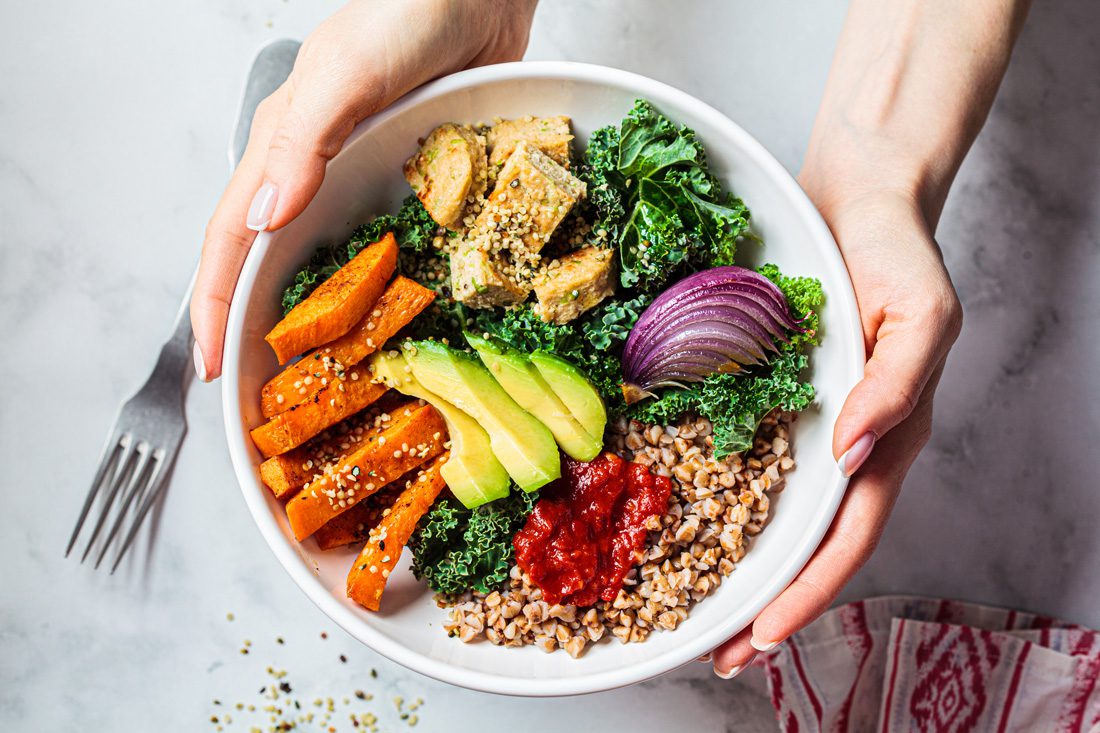The principles, myths and benefits of veganism!

Eating a vegan diet can help reduce the risk of or reverse some of the top diseases afflicting Americans, including obesity, heart disease and diabetes. “Even if you don’t go 100% vegan, your health can significantly change. I was born and raised in Wisconsin, a large consumer of milk and cheese, and when I took dairy out of my system, I realized how lethargic and sluggish it made me feel. I’ve never gone back,” says Michael Elsen, executive chef of the casual vegan eatery Full Taste Vegan in Chamblee, who has been eating and cooking animal-free fare for 30 years. The most challenging part about going vegan can be psychological, Elsen says. “Many people in the U.S. were brought up eating three meals per day that often have meat and dairy in them. Because that’s so ingrained in the American food system, it can be hard to reprogram your brain to go vegan.”
But where there’s a will, there’s a way. Whether you want to go all in or simply incorporate some of the principles of veganism into your diet, Elsen offers some tips for making healthy vegan choices.
The Basics
A strictly vegan diet does not include anything that has an animal or an animal byproduct, such as lard. “There is a slight divide in people who refer to themselves as vegan, and that is around honey. A lot of vegans will eat bee honey. Those who don’t call themselves ‘plant-based,’” Elsen says.
Hidden Ingredients
“There are many products that have hidden animal products in them, and people don’t realize it,” Elsen says. He provides examples of certain beers and wines that contain an animal-based clarifying agent, as well as some pastas, candies and ramen seasoning packets made with animal fat. If you want to avoid these items, do your research. Read ingredient lists and get educated on what things are and how products are made, Elsen suggests. “These days, some brands are labeling products 100% vegan or 100% plantbased because people are looking out for those words,” he says.
Unhealthy Foods
Remember: A cookie is still a cookie. “Healthy is when you eat things in moderation, which is a principle across every diet,” Elsen says. In addition to sugar, the chef says to look out for prepackaged foods loaded with dyes and genetically modified ingredients (“look for non-GMO to avoid ingesting pesticides”). “Also, a lot of people who go vegan augment their meat-based diet with loads of [empty] carbs like pastas, which are easy and quick.” Instead, consider plant proteins, vegetables, fruits and whole grains as the bulk of your meals.
Enough Protein
It is a myth that you can’t get enough protein from a vegan diet. Vegan sources of protein include tofu, beans, veggie burgers, nuts, chia seeds, soy, quinoa, peas and lentils. Here, too, Elsen advises to look for quality, non-GMO items. Concerned about not getting enough protein? Work with a nutritionist to create an individualized plan for how much your body needs based on your activity level.
B Vitamins
Some of the richest sources of B vitamins are fish, meat, poultry, eggs and dairy, as well as leafy greens, legumes and seeds. So when removing the animal products from your diet, it isn’t uncommon to need a vitamin B supplement. Low B vitamins in the body can impact concentration, create fatigue and potentially lead to memory loss. Make sure you’re getting enough, which your annual physical’s blood panel can tell you.
FULL TASTE VEGAN
770.696.4741
fulltastevegan.com
@fulltastevegan
Managing Editor and Wellness Columnist at Simply Buckhead. Blogger at Badass + Healthy.











